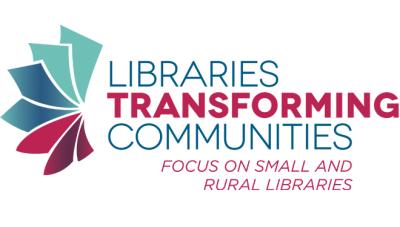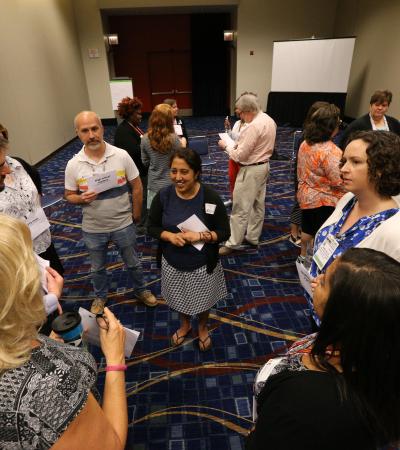ALA is again accepting applications for Libraries Transforming Communities (LTC): Focus on Small and Rural Libraries, a grant initiative that will distribute nearly $2 million to libraries.
>>> Watch our pre-application webinar, recorded Jan. 26 <<<

Participating libraries will receive training in how to lead conversations, a skill vital to 21st-century librarianship. Library workers will complete a free ALA e-course on basic facilitation skills; host at least one conversation with community members on a chosen topic; and receive $3,000 to support community engagement efforts. Grant funds may cover a range of expenses, including staff time and collections and technology purchases.
Up to 450 grants will be awarded in Round 2 of ALA’s community engagement funding initiative. Library workers may apply online for grant funding by March 4 at ala.org/LTCFocus.
Also this week, ALA announced the first 200 LTC: Focus on Small and Rural Libraries grant recipients, who applied in Round 1 in late 2020. They comprise public, academic, school and tribal libraries representing 43 states. View the full list.
Below are examples of conversations proposed by the first 200 grant recipients:
- Stair District Library (Morenci, Michigan) will talk with residents about the recent loss of the community’s 150-year-old newspaper in a discussion series called Extra! Extra! Read All About It!...But Where?.
- Danville High School (Danville, Arkansas) will have an online conversation with students, school staff and residents about the importance of mask-wearing during the COVID-19 pandemic.
- Following a surge in suicides in their agricultural and mining town, staff at Duncan Public Library (Duncan, Arizona) will explore mental health through book and film talks and create an ongoing community support group called the Brain Support Brigade.
- Neligh Public Library (Neligh, Nebraska) will host online discussions about race for their predominantly white community. The series will kick off with a reading of a historical fiction title set in nearby Omaha after the 1919 lynching of African American resident Will Brown.
- Olive G. Pettis Memorial Library (Goshen, New Hampshire) will host nonfiction book discussions about nature. The library will also install permanent plaques throughout the region identifying local flora and fauna with QR codes that residents can scan for more information.
“We were so impressed by the dedication and creativity we saw in this first round of grant applications, and we are excited to see the effects of this funding spread across the country,” said ALA President Julius C. Jefferson, Jr. “If you are a library worker in a small or rural community and are inspired by these projects, I encourage you to apply for funding by March 4.”
In September 2020, ALA announced plans to award nearly $2 million to small and rural libraries in 2020 and 2021 to help them address issues of concern in their communities. Up to 650 U.S. libraries in small and rural communities will receive $3,000 to tackle issues ranging from media literacy to COVID-19 safety to unemployment. The initiative is part of ALA’s longtime commitment to preparing library workers for the expanding role of libraries.
The opportunity is open to libraries serving small and/or rural communities in the U.S. and U.S. territories. The Institute of Museum and Library Services (IMLS) defines small communities as those with a legal service area population of 25,000 or less and rural communities as those more than, or equal to, five miles from an urbanized area.
Since 2014, ALA’s community engagement initiative, Libraries Transforming Communities, has re-imagined the role libraries play in supporting communities. Libraries of all types have utilized free dialogue and deliberation training and resources to lead community and campus forums; take part in anti-violence activities; provide a space for residents to come together and discuss challenging topics; and have productive conversations with civic leaders, library trustees and staff.
Libraries Transforming Communities: Focus on Small and Rural Libraries is offered in partnership with the Association for Rural & Small Libraries (ARSL).

